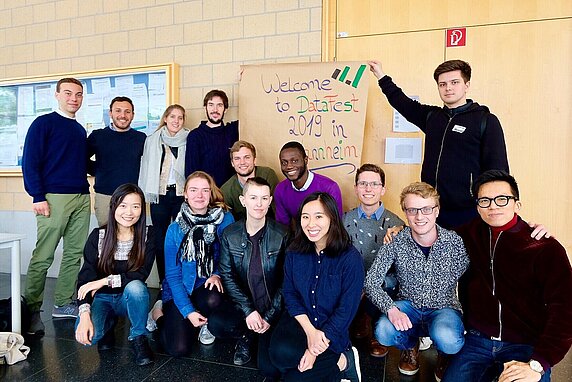
Get to know the MPP graduate who’s building up the new data science programme and join our upcoming coffee chat.
It was in the midst of the pandemic when Huy Ngoc Dang earned his Master of Public Policy degree this summer. He started working as Manager of the Hertie School’s Data Science Lab and as a main architect of the university’s newest two-year master’s programme, the Master of Data Science for Public Policy (MDS).
What motivated you to work as Programme Coordinator for the new MDS degree and as Manager of the Data Science Lab? What do you do in each role?
I was meant to come home and continue with my job in Vietnam, but with the COVID-19 crisis, all flights were cancelled and there was no way home. While applying for jobs in Germany, I saw the advertisement for the position at Hertie. I hesitated for a long time but eventually applied because I could not stop thinking about ways to make this an outstanding master’s degree for future students. And I’m very glad that the school leadership decided to put their trust in me.
As the coordinator for the MDS, I help design the curriculum and its accreditation. As a recent graduate, I bring my perspective on what could bring the best value to our students, and I work with other departments within Hertie to ensure we have a solid programme that can make our students excited and proud to take part.
As the Data Science Lab Manager, I help instructors with their courses, taking some of the workload off other members and aid in strategic planning for the lab’s future activities. And hopefully, after the MDS programme is launched, I will also have some time for research and building fun and useful digital prototypes with the lab.
In short, for both roles, I’d like to think that my main task is to make people happy.
What kinds of courses and topics can future students expect in the Hertie School’s MDS programme?
There are three pillars in the MDS curriculum: Public Policy, Data Science and Solution Engineering. These come from the workflow of a typical data science project: first, we need to understand the problem and the domain knowledge (which, in this case, are policy, management and decision-making processes), then we need to engage in the whole pipeline of data science – from collecting data to cleaning and transforming it for analysis, so as to finally communicate the findings and insights or deliver some concrete solutions to stakeholders.
MDS candidates, therefore, will be trained in all these diverse skills to become well-rounded policy and data science practitioners. They’ll be able to look at a data problem given to them by a public, private or non-profit institution, envision a pathway to a solution and perhaps build a working prototype to address it with the resources available to them.
Why do you think public policy is necessary for data science/data scientists – and vice versa?
Data is no longer simply the by-product of business processes, but the new oil that runs the engines of the world today. Thus, it is rightly heavily regulated. Public policy nowadays governs the space and domains in which data scientists operate with laws and procedures. Without an understanding of what these regulations require and an awareness of how the decision-making process transpires, practitioners in the field cannot leverage the power of data under the assumption of absolute legitimacy and cannot raise their voices of concern when policymakers take important decisions that have significant impact on their businesses.
On the other hand, as data science and intelligent systems permeate and transform all aspects of modern life, policymakers would be remiss not to educate themselves on the limitations and possibilities of these technologies, not only to regulate but also to expand their toolkit for good governance. Data science, together with a sound grip of the domain and awareness of potential biases and ethical issues, can provide a potent framework to improve evidence-based policy decisions and give more credence and insights to policy choices.
The intersection of these two disciplines, therefore, is an exciting arena that I think will be quite challenging but ultimately rewarding for our future students to tackle.
What were your favourite courses in the MPP programme and why?
It would have to be Statistics I. I struggled throughout that course and got the worst grade of my academic career, but I absolutely loved everything I learned. It was an eye-opening subject that taught me how to understand the world on a deeper level. I plotted my revenge the winter break between the semesters and doubled down on my efforts to learn all I could about statistics, mathematics and data analysis and haven’t looked back since.
The data-focused courses in our second year (e.g. Natural Language Processing with Deep Learning and Python Programming for Data Scientists) were also excellent since they were project-based and gave us the freedom to experiment, learn new technologies, and build up portfolios in different domains.
What is your fondest Hertie School memory?
Competing in the DataFest Hackathon with other Hertie students. We shared skills, insights and learned how to solve problems together in the span of three days. Afterwards, all the Hertie teams visited Heidelberg together. Walking through the ruins of the palace under the late spring sun with everyone reminded me of how lucky I was to be living in Europe.
As a bookend to the trip, we had dinner and talked about life and our aspirations. I think a lot of lovely Hertie memories are like that, just simply sitting around a big table with our guards down and learning about each other’s life stories.
Could you sum up your Hertie School experience for us in one word?
“Grit-building”.


